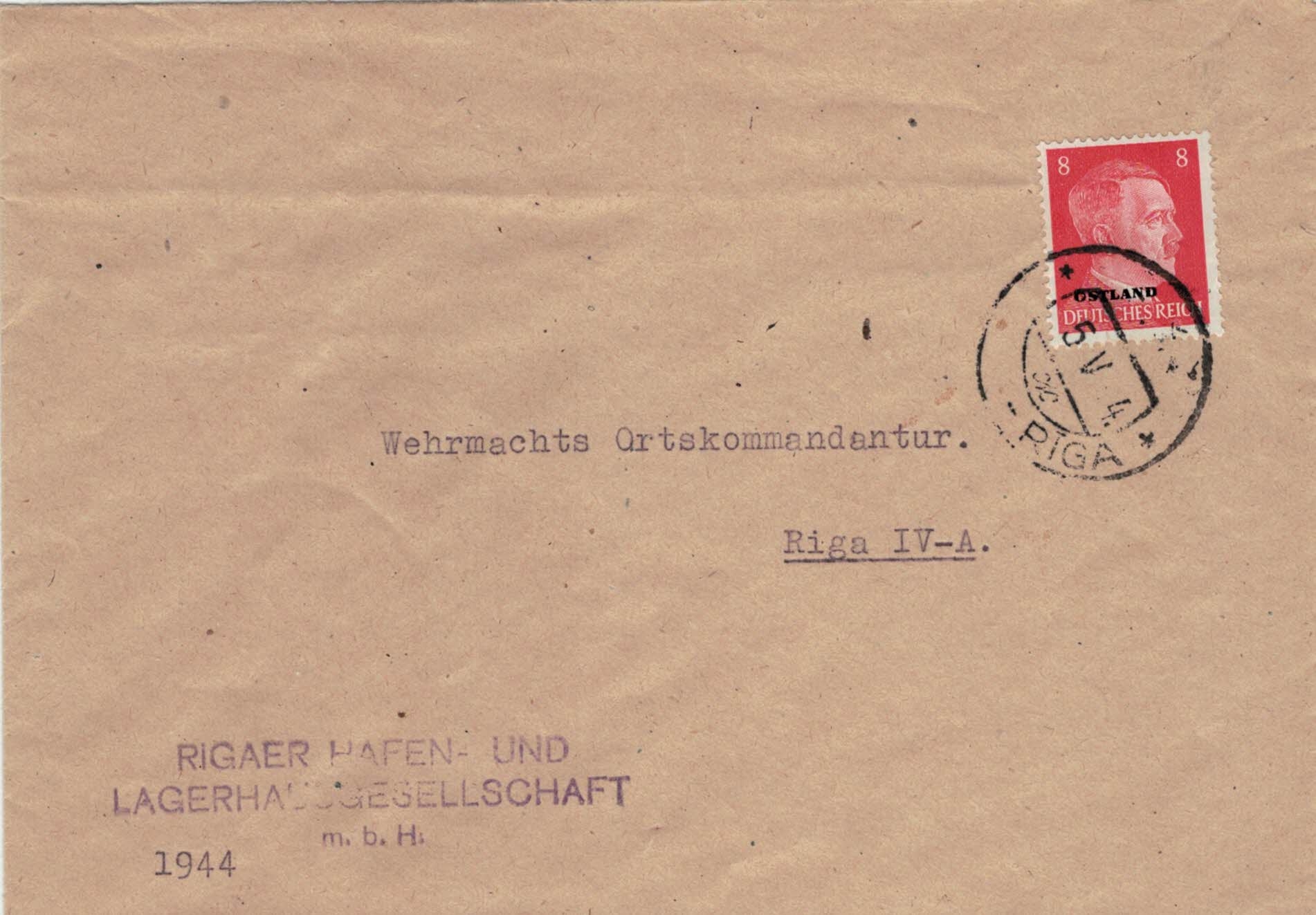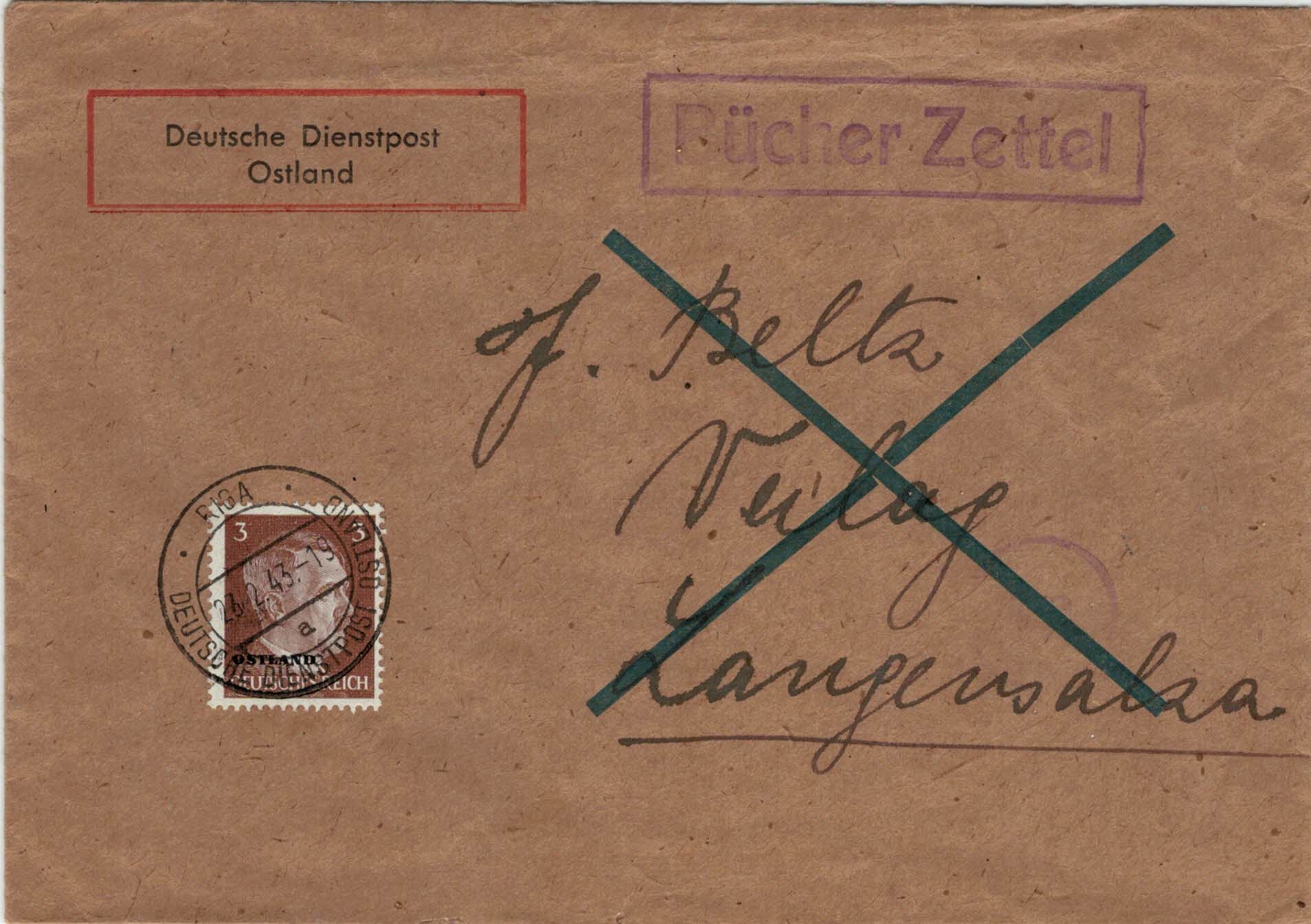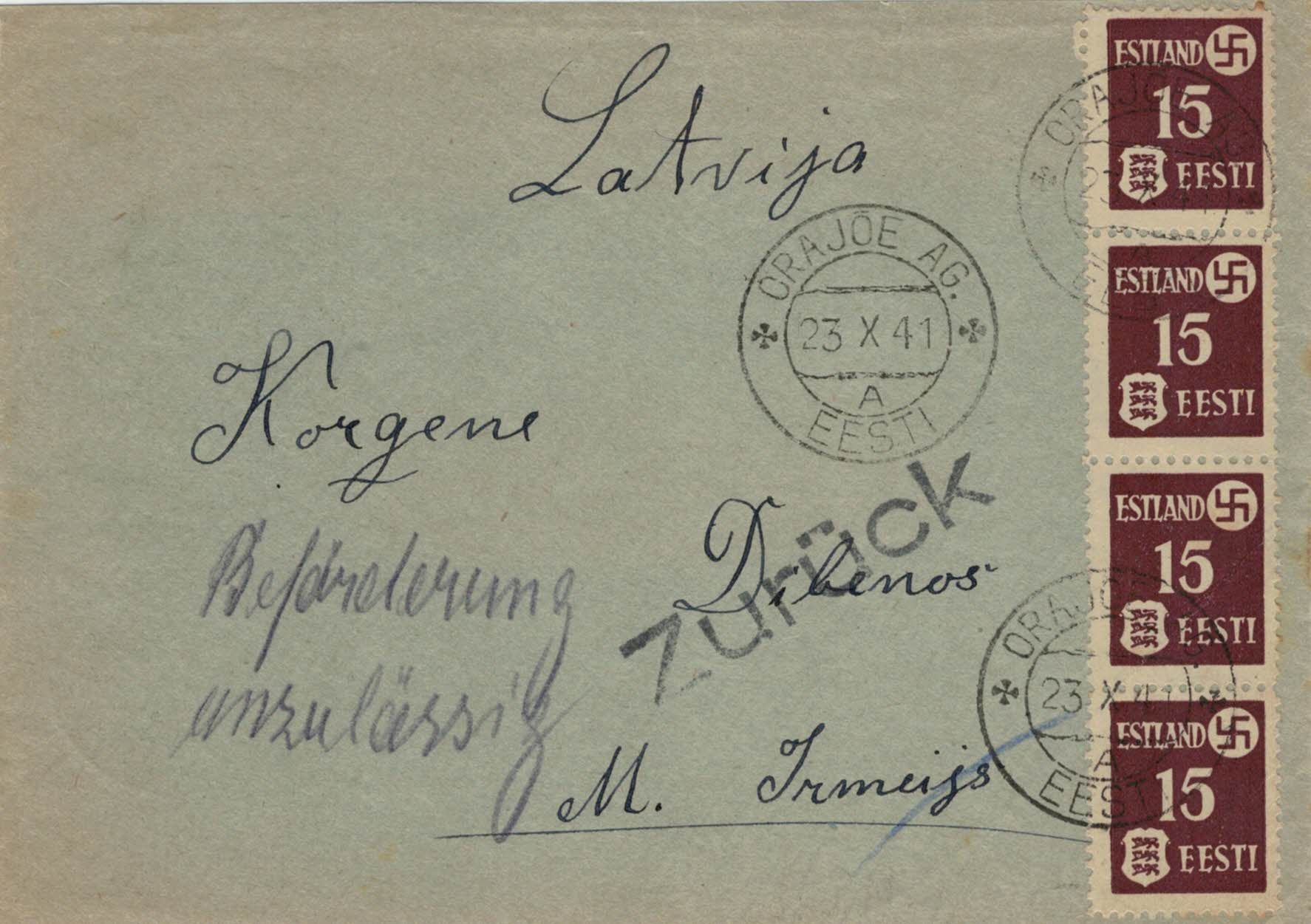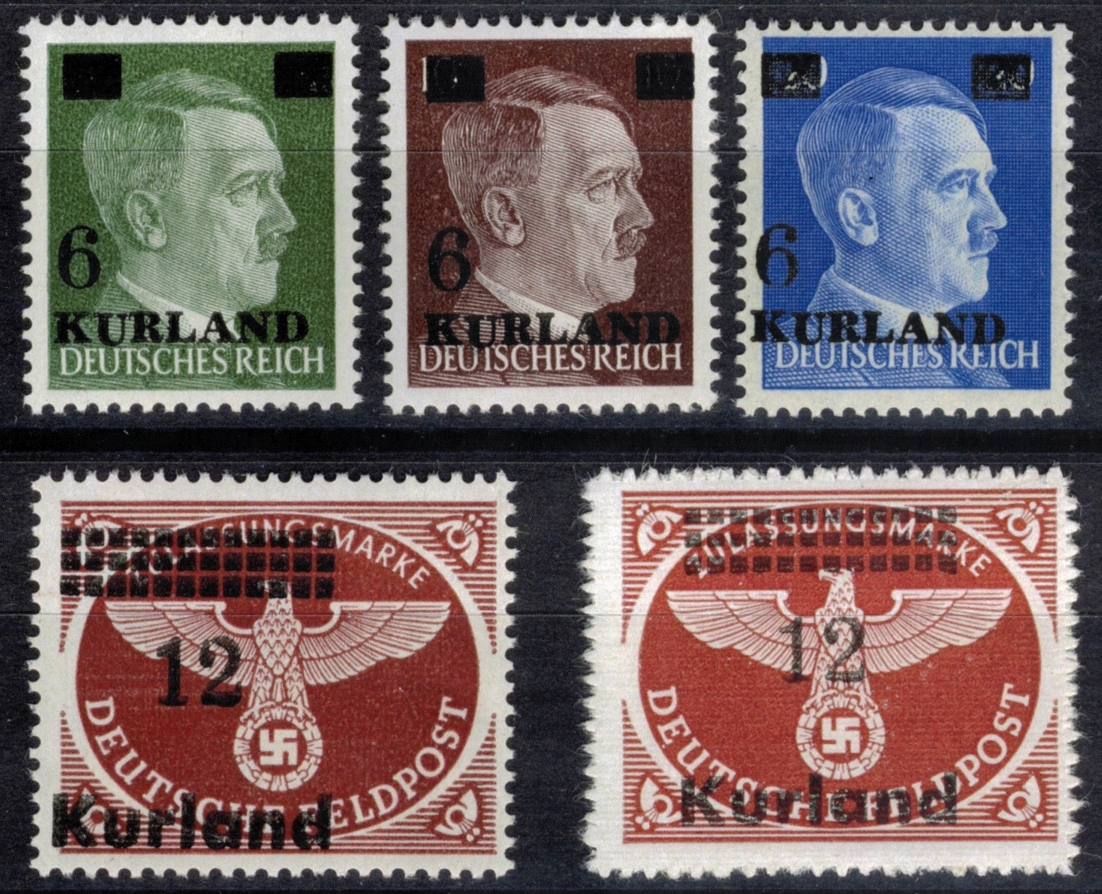Lettland
-
Courland, Semigallia, Latgale
-
Royal Swedish Post
-
Imperial Russian Post
-
German Occupation / Ob. Ost
-
Independent Republic of Latvia
-
Soviet Occupation
-
German occupation / Ostland / Kurland
Ostland
For general information on "Ostland", see "German occupation / Ostland" in the collection area "Estonia".
General District Latvia
With the capture of the capital Riga by German units on July 1, 1941, the Latvian postal administration resumed its activities nationwide. This was largely done on its own initiative and in cooperation with the German military commanders. All previously issued stamps of the Soviet Union and Latvia in Lat currency retained or regained franking force from July 8 to September 19, 1941, except for the Latvian Soviet Republic issue, Michel No. 292–304.
Thus, unlike in Estonia and Lithuania, no local issues appeared in Latvia, but only the national postal issue, Michel Nos. 1 to 6, on Soviet definitive stamps "Workers and Peasants" with the overprint "LATVIJA / 1941 / 1. VII" between July 17 and 23, 1941. Between September 20 and October 30, 1941, the national postal issue remained the only stamp issue valid for postage at Latvian civil post offices nationwide.
It was not until the decree of August 16, 1941 that the first two post offices of the Deutsche Dienstpost Ostland (DDO) opened their counters in the General District of Latvia: Libau (Liepāja) and Mitau (Jelgava), followed by 27 other offices by the end of 1941. These were not open to Latvian residents, but exclusively to German offices, authorities, organisations and companies and operated under the conditions of the General Post Commissariat Ostland described above.
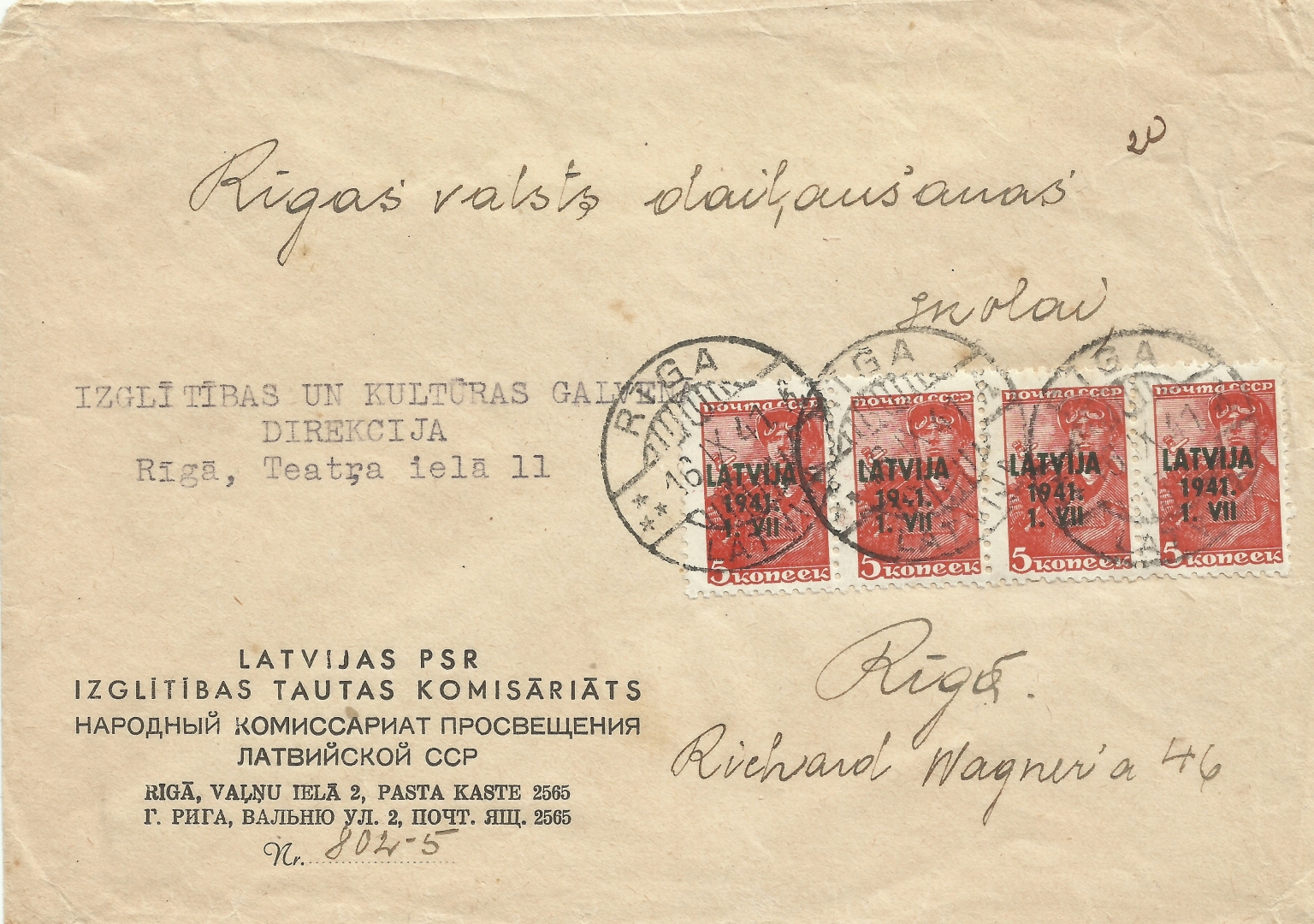
Local letter Riga of 6.IX.41 (ex Ruud van Wijnen)
Postmark RĪGA b LATVIJA 16 IX 41, HvH 1165.98
Postage 20 Kop, Michel No. 4(4), for local letter up to 40g
Postage period Landespost 1.7.–30.9.41 (= Soviet Postage for local letter)With effect from October 1, 1941, the entire Latvian postal and telegraph administration was placed under the authority of the General Post Commissioner Ostland. From then on, the German Post Service Ostland and the Latvian National Post Service were under his authority as the postal commissioner for the General District of Latvia. More than in Estonia and Lithuania, the Latvian national post office retained a higher degree of relative autonomy in its internal operations until the end of the Ostland period. This was expressed, among other things, in the fact that written decrees and orders always bore the joint signature of the General Postal Commissioner, Dr Hans-Joachim Münzel, and the Director of the Latvian Postal and Telegraph Administration, Alfreds Olte.
At the same time, on October 1, 1941, the DDO began exchanging mail between the General Districts of Latvia and Lithuania, whereby the Latvian National Post Service delivered the outgoing mail of civilians to the DDO in Riga and the latter handled the transport to the General District of Lithuania. With the start of civilian mail traffic to the German Reich on October 7 (in real terms not before October 22), a similar arrangement was applied in that Latvian Land Post had to deliver outgoing mail to the offices of the German Service Post in Riga, Libau and Mitau.
At the end of October 30, the Latvian national postal issue lost its franking validity. Already from October 1, only German Reich stamps were sold in the regional post offices, and from November 4, stamps with the overprint "Ostland" were successively sold.
From January 15, 1942, it was possible again even for the Latvian civilian population to send mail to and receive mail from Estonia.
By decree of February 7, 1942, telegram traffic between the DDOs Kauen (Kaunas), Libau (Liepāja), Riga (Rīga) and Wilna (Vilnius) was also opened for civilians of the General Districts of Latvia and Lithuania. On April 1, 1942, the Latvian postal savings bank and postal cheque service was converted to that of the German Reichspost. From then on, this service was provided exclusively by the offices of the German Service Post.
Until Riga was evacuated by German forces on October 14, 1944 and the offices of the Reichskommissar Ostland and the General Postkommissar were relocated from September onwards, first to Libau and then to the territory of the Reich, postal developments in the General District of Latvia also became increasingly chaotic.
For the collection area "Kurland/Courland" see below.
Timetable General District of Latvia
Ostland Latvia June 22, 1941
German Attack on the Soviet UnionJune 25, 1941
Foundation of the Reichskommissariat Ostland and the General Post Commissariat OstlandJuly 1, 1941
Capture of the capital Riga by German units, nationwide resumption of the Latvian postal administration's activities.July 8 to September 19, 1941
All previously issued stamps of the Soviet Union and Latvia in Lat currency become valid again for franking, with the exception of the Latvian Soviet Republic issue Michel no. 292–304from July 1941
Issuance of numerous local issues, on the national level national postal issues (in ruble currency)July 17 to 23, 1941
In Latvia only Landpost issue, Michel Nos. 1 to 6, on Soviet definitive stamps "Workers and Peasants" overprinted "LATVIJA / 1941 / 1st VII".August 16, 1941
Opening of the first two post offices of the Deutsche Dienstpost Ostland (DDO) in the General District of Latvia: Libau (Liepāja) and Mitau (Jelgava)
. By the end of 1941, opening of 27 further officesSeptember 20 – October 30, 1941
The Land Post issue is the only stamp issue valid for postage in the Latvian civil post offices.October 1, 1941
– Subordination of the entire Latvian postal and telegraph administration to the General Post Commissar Ostland
– Start of the postal exchange between the General Districts of Latvia and Lithuania
. From 1.10. in the regional post offices only sale of German Reich stamps.October 7, 1941 (in real terms not before October 22)
Commencement of civilian postal traffic to the German ReichOctober 30, 1941
End of franking validity of the national postal issueFrom November 4, 1941
issuance of own stamps for the Reichskommissariat Ostland (in Reichsmark and Pfennig), toleration of the use of stamps of the German Reich without imprint
Nationwide sale of stamps with overprint "Ostland" (DDO and Landespost)January 15, 1942
Resumption of postal traffic with EstoniaFebruary 7, 1942
Telegram traffic between the DDOs Kauen (Kaunas), Libau (Liepāja), Riga (Rīga) and Wilna (Vilnius) also for civilians of the General Districts of Latvia and Lithuania.April 1, 1942
Conversion of the previously Latvian Postsparkassen- und Postscheckdienst (national savings bank and giro services) to that of the Deutsche Reichspost (henceforth exclusively via the offices of the DDO).From July 1, 1943
reduced charges for local traffic for postcard and letter from 6 and 12 Pfennig to 5 respectively 8 Pfennig.From January 1944
Uniform postal code (area code) "5c" for the entire area of the Generalpostkommissariat Ostland.from July 1944
Clearance of the Baltic from German forcesOctober 14, 1944
Evacuation of Riga; relocation of German offices of the Reichskommissariat / Reichspostkommissariat Ostland first to Libau (Liepāja), then to the Reich territory.April 20, 1945
Overprint issue Kurland, Michel Nos. 1 to 4
Kurland (Courland)
Until the evacuation of Riga from German forces on October 14, 1944 (and thus the relocation of the office of the General Postal Commissioner Ostland first to Libau and then to the territory of the Reich), postal development in what was to become Courland proceeded as part of the development in the General District of Latvia.
With the statutory dissolution of the Reichskommissariat Ostland on January 24, 1945, the responsibility of the General Postal Commissioner for the General District of Latvia also formally ended. He was replaced on January 15, 1945, with effect from January 25, by the responsible Wehrmacht commander of the Kurland Army Group, General Heinrich von Vietinghoff, as "General Kurland“.
The "Kurland" collection area is therefore historically not part of the "Reichskommissariat Ostland" collection area, but is a separate collection area under the responsibility of General Kurland and the Reichspostministerium. Notwithstanding this, the Surcharge issue Kurland of April 20, 1945 is often regarded by collectors as the "last Ostland issue".
At the time of the total German surrender on May 8, 1945, the territory of the former General Postkommissar Ostland was limited in real terms to the German service post offices in Libau (Liepāja), Windau (Ventspils), Goldingen (Kuldiga) and Talsen (Talsi) as well as the offices of the Latvian national post in this area. Some of these offices operated until they were occupied by Soviet troops at the end of May 1945.
The surcharge issue, produced from previously unoverprinted stamp stocks of the Kurland Army Group, Libau Field Post Office, was to be officially issued at the remaining post offices on April 20, 1945, Adolf Hitler's 56th birthday.
Initiated by the Germans without any postal necessity, it is still not clear whether and to what extent the stamps were indeed issued. Pieces used for postal purposes are not known to date.
The OSTLAND overprint was still to be used for franking, and cash franking was prescribed if there was a shortage of stamps.
In distinction, there was an urgent need to issue Kurland express letters from March until the end of 1945. They were used to supply airmail to the German troops trapped on the front – homeland, Michel No. 16 field post stamp.
For this purpose, vertically halved German fieldpost packets were used–Zulassungsmarken für Weihnachtspäckchen (Permission stamp for Christmas Parcel) Homeland – Front, Michel No. 4. These were affixed to fieldpost folded letters and cards, authenticated with the official seal of the fieldpost control centre 734 (Libau) and issued to the soldiers. About 300 used Kurland express letters have been certified as genuine to date.
With the re-occupation by Soviet troops and (re-)integration into the Soviet Union, its postal rates and regulations were generally applied again.
Timetable Kurland/Courland
Year Date Event 1944 From September Transfer of the postmaster general's office to Libau (Liepāja) and of the administration (including the collector's service) to Köslin in Hinterpommern. Mid-October Clearance of Riga (October 14)
Evacuation of the General District of Latvia
Formation of the so-called "Kurland Cauldron"
1945 January 15 Renaming of Army Group Nord to Heeresgruppe (Army Group) Kurland (effective from January 25).
Subordination of all postal service providers (DDO, Landespost, Feldpost) to the Kurland Army Group.
January 24 Dissolution of the Reich Commissariat Ostland from January Ending the collector service
Transfer of remaining parts of the administration of the RK and RPK Ostland to Chemnitz, Artern and Frankfurt/Oder
March until end of April Kurland Express Letters April 20 Overprint issue KURLAND on stamp stocks of the Army Group Kurland, Field Post Office Libau May 8 Germany's unconditional surrender until the end of May The offices of the Deutsche Dienstpost Ostland in Kurland, i.e. Libau (Liepāja), Windau (Ventspils), Goldingen (Kuldiga) and Talsen (Talsi), as well as the offices of the Latvian Land Post continue to operate until the Soviet occupation. Special literature is recommended:
Latvia before and as part of the "Generalpostkommissariat Ostland". Harry von Hofmann Verlag, Hamburg 2001. 448 pp. ISBN 3 7636 5074 1.
Wilhelm van Loo: Postal traffic Kurland (Courland) (1944-1945). Publication series of the Bund Philatelistischer Prüfer e.V., Volume 7, Aachen 2016. 312 pp. Without ISBN
Reich Commissariat Ostland, Crime scene and object of remembrance. Published in: Age of the World Wars. Ed. Military History Research Office, Vol. 8. Ferdinand Schöningh 2012. 371 pp. ISBN 978-3-506-77188-9.
https://ome-lexikon.uni-oldenburg.de/regionen/reichskommissariat-ostland
http://www.academia.edu/20062892/Das_Reichskommissariat_Ostland
Camp Mail / Latvians in Exile
Independent Republic of Latvia (restored)
Private Mail in Latvia



